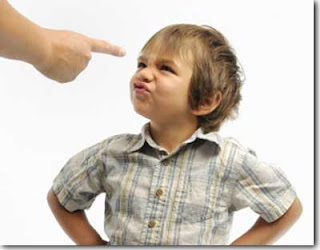We've all awkwardly been there. Your perfectly angelic child is innocently strumming a kid-sized guitar, minded his own business, when his "friend" jumps off the couch and dropkicks him in the face. Best case scenario is the kid's parent pounces on them like a hawk, dutifully running down a laundry list of reasons why dropkicking your friends in the face is a bad thing. Next best case scenario is the kid's parents aren't there and you're free to lecture them as you see fit. This is always tricky as you have the luxury of being without the watchful eye of the respective parent, yet you have to be careful not to punish too harshly and find yourself on an episode of Judge Judy. The absolute worst case scenario is the kid's parent is there and does nothing. And this is when you learn a harsh, yet inevitable lesson: Jerks raise jerks.
"You can't point at me! You're not my Dad!" (I know, that's the problem.)
Let me be clear about one thing before I go any further. My kids are both more than capable of being jerks. They practice on each other all the time. In fact, it's human nature to respond with anger when someone takes something that was perceived as "yours and only yours," (pretty sure this is how rap was born) even if that something wasn't taken with malicious intent. The key is to teach our children to become comfortable with compromise, with sacrificing. You'll find more often than not that the parents who don't hold their children responsible for being jerks were never held accountable by their own parents growing up. It's a viscious, jerky cycle.
But what do we do? How do we handle it when someone else's kid does something either to your kid or around your kid that you find completely reprehensible? The answer, naturally, isn't so easily determined (or else I wouldn't be asking it). Here are some options I've found most successful.
Shout in the general direction of all the kids and ask, "What is going on here?!"
It's safe to say that every kid there had something to do with that China set smashing on the floor, so don't single anyone out. Odds are another authority figure will piggy-back on your anger and blame the entire thing on their own kid. The downside of this method is it also frequently results in the awkwardness of the respective parent half-heartedly disciplining their kid because they'll look like a tool if they say nothing.
Danny Tanner It
You remember the scene. Full House's MVP Dad would pull one of his daughter's aside (when he really felt brave, he'd reel in Kimmy Gibbler, too) for a heart-to-heart about how badly they screwed up. It was brilliant if you think about it. Instead of raising his voice (and his blood pressure), he sent them to their room, made them think about it, then calmly explained what terrible human beings they were. Naturally, if you're doing this with a child other than your own, you'll need to tread lightly. But as long as you say what you're saying with a soothing tone (and a string section accompaniment), you lessen the risk of a fist fight with the other supposed adult in the room.
Falsely blame everything on your own kid
It sounds counterproductive, but I assure you it works most of the time. Most of us are decent enough to try to avoid the uncomfortableness of yelling at other people's children, so we instinctively place the blame on our own, even if they aren't the main culprit. It happens to me all the time. Antonio wants to play with his friend's ride-on car, said friend doesn't want to give Antonio a turn. Antonio then sulks and insists he wants nothing to do with him. At that point, I step in and remind Antonio that the car isn't his and he has to respect friend's decision (even though deep down I agreed that it was time to share). Almost every time, the parent steps in and yanks the kid out of the car, giving Antonio what he wants as his friend wails in his rear view mirror. Half the time you're the one yanking your kid out of the car kicking and screaming. It's never pleasant and almost every time, you think your kid's being less of a jerk than the other one.
Naturally, we all live under the guise that our child is better behaved than others. After all, they're a reflection of us and our disciplinary actions. If they suck then that means we suck. And frankly, a lot of us suck. And the rest have to simply deal with it.The sad fact is that, as parents, we're almost certain to lose at least one friend over the way we choose (or don't choose) to manage our kids' behavior when they're socializing. Ultimately,you'll end up spending more time with the parents of children who have similar disciplinary mindsets as you do, distancing yourself from the Mom who lets her daughter pour White Out all over your leather couch. But if said Mom is part of your family, you're screwed. And if that's the case, you better have a strong lower lip, because you'll be biting it more than you'd like!
Thanks for reading and pass it along to others who might enjoy.
-Joe DeProspero
jdeprospero@gmail.com
Follow me on Twitter here!
#parenting

No comments:
Post a Comment